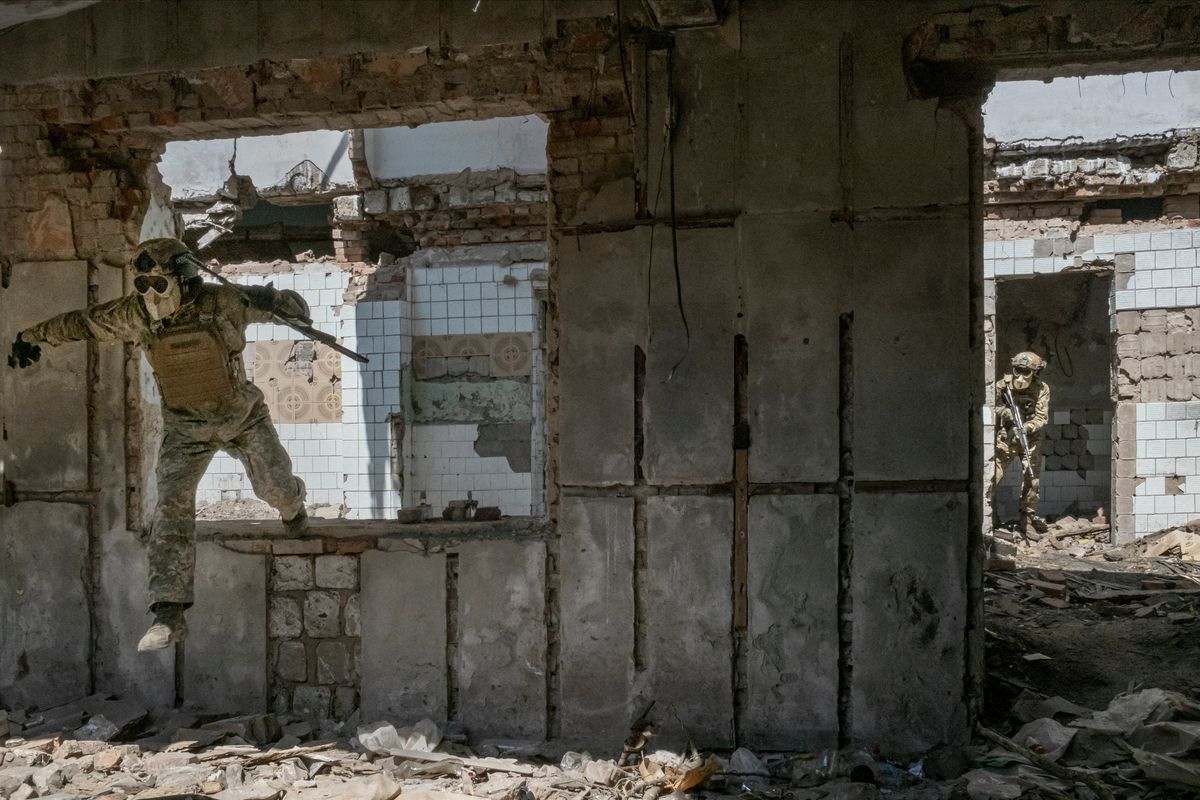Wagner leader accuses the Russian military of attacking his mercenaries

Yevgeny V. Prigozhin, the outspoken Russian mercenary tycoon, accused the Russian military of attacking his private forces on Friday, shortly after he described his country’s invasion of Ukraine as a “racket” perpetrated by a corrupt elite chasing money and glory without concern for Russian lives.
For months the Russian war effort has been hampered by the bitter feud between Prigozhin, who leads the Wagner force, and top military leaders, whom he has accused in scathing terms of incompetence in conducting the war.
But the accusations Prigozhin leveled in audio and videotaped messages posted on Friday took the conflict to a new level. Never before had Prigozhin accused Russia’s military leaders of attacking his forces, nor had he asserted in such stark terms that the Kremlin’s stated justification for the war was nonsense.
In a vague statement, Prigozhin promised retaliation for the alleged strikes and declared that Wagner fighters would march to “uncover the reasons behind the ongoing chaos in the country.”
After Prigozhin’s allegations became public, the state news agency, Tass, reported that the country’s top security agency, the FSB, had opened a criminal investigation in connection with statements “made on behalf” of Prigozhin, including apparent calls for armed rebellion.
He accused the Russian minister of defense, Sergei Shoigu, of orchestrating a deadly attack with missiles and helicopters on camps to the rear of the Russian lines in Ukraine, where his soldiers of fortune were bivouacked.
He said that some Wagner fighters died and accused Shoigu of overseeing the strikes himself from the town of Rostov-on-Don in southern Russia, near Ukraine.
“The evil carried by the country’s military leadership must be stopped,” Prigozhin said.
The mercenary leader’s claims could not be immediately verified. The Russian defense ministry denied the allegations, saying in a statement that the messages Prigozhin had posted about supposed strikes on Wagner camps “do not correspond to reality.”
Dmitry Peskov, the Kremlin’s spokesman, said that President Vladimir Putin is “aware of all events around Prigozhin,” according to Interfax, a Russian news agency.
Prigozhin’s accusations created a ripple effect among Russian pro-war activists, who fear that an open conflict between the army and Wagner forces could threaten the Russian front lines during the Ukrainian counteroffensive. In Ukraine, some viewed his statements as more evidence of internal divisions within the Russian war effort.
In an earlier videotaped speech, Prigozhin did not explicitly impugn Putin, instead casting him as a leader being misled by his officials. But in dismissing the Kremlin’s narrative that the invasion was an existential necessity for the Russian nation, Prigozhin went further than anyone in Russia’s security establishment in publicly challenging the wisdom of the war.
“The war wasn’t needed to return Russian citizens to our bosom, nor to demilitarize or denazify Ukraine,” Prigozhin said, referring to Putin’s initial justifications for the war. “The war was needed so that a bunch of animals could simply exult in glory.”
Friday’s diatribes deepened the enigma of Prigozhin’s ambiguous role in Putin’s system.
His Wagner troops, composed of veteran fighters as well as thousands of convicts whom Prigozhin personally recruited from Russian prisons, proved key in capturing the Ukrainian city of Bakhmut in May after a monthslong battle.
But during the battle for Bakhmut, Prigozhin also emerged as a populist political figure, excoriating Russia’s military leadership for corruption and for not providing his forces with enough ammunition. His angry recordings and videos posted to the Telegram messaging network cast top military and Kremlin officials as unaware and uncaring of the struggles of regular Russian soldiers.
Putin has not reined in Prigozhin, even as his security forces have jailed or fined thousands of Russians for criticizing the military or opposing the war. Some people who know Putin have said they believe that the president still sees Prigozhin as a loyal servant applying needed pressure on a sprawling military apparatus. Others theorize that the Kremlin has orchestrated Prigozhin’s tirades against Shoigu, the defense minister, to deflect blame from Putin.
But Friday’s video complicated the picture, with Prigozhin going after not just Shoigu but also unnamed “oligarchs” around Putin, while casting the entire official rhetoric around the invasion as a sham.
He said there was “nothing out of the ordinary” in Ukraine’s military posture on the eve of the February 2022 invasion – challenging the Kremlin’s justification that Ukraine was on the verge of attacking Russian-backed separatist territory in Ukraine’s east.
“Our holy war with those who offend the Russian people, with those who are trying to humiliate them, has turned into a racket,” he said.
The comments come as Russia fights to hold back Ukraine’s counteroffensive – a fight that Prigozhin asserted in his video was going much more poorly for Russia than the government was letting on.
On Telegram, pro-war commentators quickly pushed back against that assertion, including Igor Girkin, a former paramilitary commander who has often criticized Russia’s top brass.
“Prigozhin already should have been handed over to a military tribunal for many things,” Girkin wrote. “Now also for treason.”